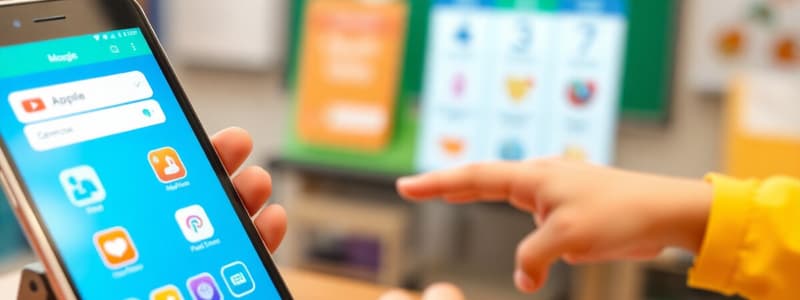Podcast
Questions and Answers
What are educational applications?
What are educational applications?
Digital tools designed to facilitate learning and teaching.
Which of the following is NOT a type of educational application?
Which of the following is NOT a type of educational application?
- Entertainment Applications (correct)
- Classroom Management Applications
- Learning Applications
- Evaluation Applications
Match the educational applications with their primary function:
Match the educational applications with their primary function:
Duolingo = Language learning through games Google Classroom = Class organization and student performance management Kahoot = Online exams and quizzes Padlet = Collaboration and communication among students
Educational applications can only be used in a classroom environment.
Educational applications can only be used in a classroom environment.
What is one benefit of educational applications?
What is one benefit of educational applications?
What is gamification in education?
What is gamification in education?
The need for _________ and internet connection can create a dependency on technology.
The need for _________ and internet connection can create a dependency on technology.
Educational applications can integrate multimedia resources for enriching the learning experience.
Educational applications can integrate multimedia resources for enriching the learning experience.
Study Notes
Aplicaciones Educativas
-
Definición: Herramientas digitales diseñadas para facilitar el aprendizaje y la enseñanza.
-
Tipos de aplicaciones educativas:
- Aplicaciones de aprendizaje: Ofrecen contenido educativo interactivo (ej. Duolingo, Khan Academy).
- Aplicaciones de gestión del aula: Ayudan a los docentes a organizar clases y gestionar el rendimiento estudiantil (ej. Google Classroom).
- Aplicaciones de evaluación: Permiten realizar exámenes y pruebas en línea (ej. Socrative, Kahoot).
- Aplicaciones de colaboración: Fomentan el trabajo en equipo y la comunicación entre estudiantes (ej. Padlet, Microsoft Teams).
-
Beneficios:
- Accesibilidad: Permiten el aprendizaje en cualquier lugar y momento.
- Interactividad: Fomentan la participación activa de los estudiantes.
- Personalización: Ofrecen rutas de aprendizaje adaptadas a las necesidades individuales.
- Recursos multimedia: Integran videos, audios y ejercicios prácticos para enriquecer el aprendizaje.
-
Desafíos:
- Distracciones: Posible dificultad para mantener la concentración en un entorno digital.
- Dependencia tecnológica: Necesidad de dispositivos y conexión a internet.
- Desigualdad de acceso: No todos los estudiantes tienen el mismo acceso a tecnología.
-
Ejemplos de aplicaciones educativas populares:
- Duolingo: Aprendizaje de idiomas a través de juegos.
- Quizlet: Tarjetas didácticas y juegos para estudiar.
- Edmodo: Plataforma de comunicación entre docentes y estudiantes.
- Coursera: Cursos en línea de universidades y organizaciones.
-
Tendencias actuales:
- Gamificación: Uso de elementos de juego para motivar el aprendizaje.
- Realidad aumentada y virtual: Mejora de la experiencia de aprendizaje a través de entornos inmersivos.
- Educación personalizada: Aprendizaje adaptativo que se ajusta al ritmo y estilo de cada estudiante.
Educational Applications
- Definition: Digital tools designed to facilitate learning and teaching.
Types of Educational Applications
- Learning Applications: Provide interactive educational content (e.g., Duolingo, Khan Academy).
- Classroom Management Applications: Assist teachers in organizing classes and managing student performance (e.g., Google Classroom).
- Assessment Applications: Enable online testing and quizzes (e.g., Socrative, Kahoot).
- Collaboration Applications: Promote teamwork and communication among students (e.g., Padlet, Microsoft Teams).
Benefits of Educational Applications
- Accessibility: Learning can occur anytime and anywhere, enhancing flexibility.
- Interactivity: Encourages active participation from students.
- Personalization: Offers customized learning paths tailored to individual needs.
- Multimedia Resources: Integrates videos, audio, and practical exercises, enriching the educational experience.
Challenges of Educational Applications
- Distractions: Potential issues with maintaining focus in a digital environment.
- Technological Dependence: Requirement of devices and internet access for effective learning.
- Inequality of Access: Not all students have equal access to technology and resources.
Popular Educational Applications
- Duolingo: Language learning through engaging games.
- Quizlet: Study aids via flashcards and interactive games.
- Edmodo: Communication platform for teachers and students.
- Coursera: Offers online courses from universities and organizations.
Current Trends in Educational Technology
- Gamification: Incorporation of game elements to motivate learners.
- Augmented and Virtual Reality: Enhances learning experiences through immersive environments.
- Personalized Education: Adaptive learning that aligns with each student's pace and style.
Studying That Suits You
Use AI to generate personalized quizzes and flashcards to suit your learning preferences.
Description
Explore the various types of educational applications designed to enhance learning and teaching processes. This quiz covers learning apps, classroom management tools, assessment applications, and collaboration platforms, highlighting their benefits and unique features.




